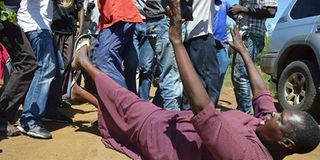How anti-IEBC protests in Nyanza have hurt businesses, made goods costly

Nominated MCA Olga Aoko leads residents in protests at Awasi in Kisumu County on October 17, 2017. The anti-IEBC protests have hurt several businesses in Nyanza region. PHOTO | ONDARI OGEGA | NATION MEDIA GROUP
What you need to know:
- Goods have become more expensive as wholesalers say the economy is in turmoil.
- Fish traders are unable to transport fish in time and they rot as roads are blocked by protesters.
- Some businesses have been destroyed in the protests.
Anti-IEBC demonstrations have been taking a toll on traders in Nyanza region, four weeks after the opposition National Super Alliance launched protests to force reforms at the Independent Electoral and Boundaries Commission (IEBC).
The Nation Team interviewed traders; from hoteliers to cobblers and taxi drivers; all of who said their earnings have dropped for lack of clientele. They blamed the current political situation.
SOLUTION
Yesterday, traders’ lobbies urged for a quicker solution to the impasse, saying the economy of the region and Kenya in general will be dented.
Western Kenya Hoteliers’ Association Chairperson Robinson Anyal told the Nation most hotels in the region have suffered losses as a result of the protests, which paralyse businesses in several towns every week.
“Hotels are suffering the brunt of the protests and its high time politicians find a lasting solution to their political squabbles,” said Mr Anyal.
“Several hotels are staring at losses because of reduced bookings. Most clients who are majorly domestic do not want to spend their money for fear of the political uncertainty.”
BUSINESS
Mr Anyal explained that the bookings have declined to 30 per cent from the 60 per cent they had before the Supreme Court ruling that nullified President Uhuru Kenyatta’s victory.
If hotels are suffering, then everyone connected to the metropolis here is ailing from the shocks of the chaos, he said.
Traders have generally closed shop for fear of looting. Others can’t get customers despite their businesses being open. For others, their sources of income were destroyed in the chaos.
Mr Adajo Otieno who operated an automobile spare parts shop in Homa Bay town lost his garage to an inferno during the protests. Mr Otieno said fire razed his shop, which had stock worth Sh6 million.
TEAR GAS
“I sell car accessories like crank shafts, gear boxes, pistons, rims and tyres. I lost all my property when my shop was set on fire,” said Mr Otieno, looking distant and his eyes filled with emptiness.
Mr Otieno accused police officers of starting the fire by firing tear gas at protesters who entered into the garage. It exploded into a ball of fire and rioters fled.
On the same day, rowdy youth beat up a police officer. His colleagues responded by rounding up youth. The following day, people avoided the market.
WRATH
Mr Boniface Ayany has been earning a living as a cobbler at the Kamas Jua Kali area, where mechanics in greasy overalls often word all day mending vehicles in Kisumu.
But for every day of the demonstrations, neither the mechanics nor cars are seen in the area. Instead, only youth burning tyres are spotted.
Mr Ayany has been making an average of Sh500 daily, but he now hardly takes home anything since the anti-IEBC demonstrations started.
“During this time you cannot be seen continuing to work and no customer can come to you lest he or she faces the wrath of protestors. Sometimes you haven’t even sown a pair of sandals,” said Mr Ayany.
MISERY
The cobbler, who has carried out the trade for years to feed his wife and two children, said political leaders should lead Kenyans out of this quagmire.
“There should be an understanding between the warring parties at the national level to end this misery we are subjected to,” he said.
Some 300 meters from the Jua Kali centre is Veronica Abiero, who sells potatoes and dagaa at the Jubilee Market.
She is no different from Mr Ayany, saying they cannot trade anymore due to the ongoing protests that, she said, have even led to a hike in prices of commodities.
TURMOIL
Mrs Abiero told the Nation that a sack of potatoes that was retailing for Sh1,050 last week, cost Sh1,500 from Monday.
“I used to get a bigger sack at Sh1,600, but it now costs Sh2,500, with farmers telling us that the economy is in turmoil,” she said.
The grocer said it forces them to wake up early in the morning to open up businesses hoping that they can make some money before the demos kick off.
But even when they open businesses early, many buyers keep off the market fearing attacks from irate youth.
GANGS
Kisumu County Micro and Small Enterprises Association Chairman Mr Anthony Kwache said there was need for a multi-sectoral approach by Kisumu residents to contain youth who take advantage of the situation to cause chaos that stifle economy.
“These women are also attacked by gangs of youth who block roads, attack and rob them yet they depend on loans as capital for their businesses,” said Mr Kwache.
“There should be a multi sectoral approach to contain youth for businesses to continue and revenue raised for services to be rendered.”
But Mr Chris Owalla, director of Community Initiative Action Group Kenya, said police should do more work in identifying and tracing criminals, who masquerade as protestors and interfere with other people’s businesses.
LOSSES
Homa Bay Business Community Chairperson Jack Nyambega said the anti-IEBC protests had resulted to losses in most towns in the county.
“Traders seeking to transport fish have counted losses because their produce gets rotten as a result of blocked roads during the protests,” said Mr Nyambega.
“Most businesses open in the morning and close two hours later when the demonstrations start.”





